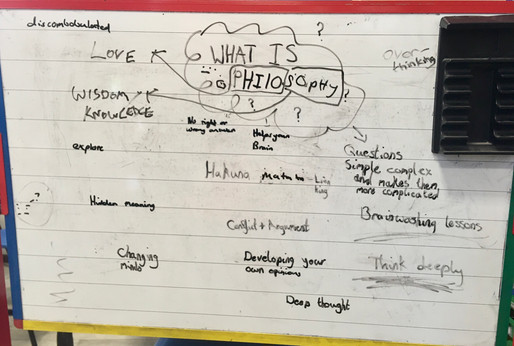When you have only 10 1-hours sessions with a class of primary school pupils, what is better? To teach them a philosophical depth - that is to go deep into a particular philosophical question and really pick at and compare the different aspects, theories, or answers that come up? Or to teach them a philosophical breadth - that is to get a brief overview of as many philosophical questions as you realistically fit into the 10 sessions.
Breadth - Philosophy with Lea Primary School
I usually take the breadth approach when I arrive at a new school because, in most cases, children have never been introduced to philosophy and it is an incredible privilege to act as a gatekeeper to the large and diverse world that the subject covers. Every week, I open the gate a little wider and a whole new set of philosophical questions for the children to chew on come tumbling through.
I got a real sense of this when I received a wonderful thank you card from the children at Lea Primary School near Ross-on-Wye. You can see that they have drawn images of the stories they remember us exploring during our time together: the Ship of Theseus (identity/change over time), Ceebie and Friendship (can robots be friends?), the Ring of Invisibility (responsibility, doing good), The Chair (objects and perception), and The Pill of Life (meaning of life). They had also explored the Frog and Scorpion and The Happy Prisoner.

What's so lovely about this is that when they think back to each of these stories they will probably remember what they thought and felt about the questions we talked about. Further, they will remember that there were lots of different stories and therefore lots of different things to think about. So I like to believe that the next time they see or hear the word 'Philosophy' this is what they will recollect and will get excited about. It shows them not only how overarching the topic is in our lives, but also that they have the choice to engage with the questions that interest them most.

And thank you, Lea Primary!
Depth - Philosophy with Gorsley Goffs Primary School
The benefits of 'breadth teaching' philosophy seem obvious with children this young. However, I have found that sometimes 'depth teaching' is the way to go. This was something I experienced at Gorsley Goffs Primary School, also near Ross-on-Wye. There was a certain hunger for more knowledge and exploration in the class, so the second session 'The Ship of Theseus' was stretched into 4 sessions, almost half of the work they did with me.
We started with the question 'Is it the same ship?'. We explored identity for the ship, and then identity for humans. We ended on the question 'If person A swapped their brain with person B, then where is A?'. The class had developed philosophical 'sides'. I had two pupils in particular who continuously tried to support their point of view, whilst the rest of the class watched and interacted knowing they had the freedom to change their minds whenever they pleased.
After we eventually exhausted that question I switched to a more 'breadth approach' for the last 5 sessions after Easter as I was eager for the class to experience more philosophical topics. But I found that the initial 'depth approach' had an incredible impact on the rest of their experience. They had seen how deep and complicated these questions could get and how precise their answers needed to be in order to get their point across to a classroom of lots of different perspectives, so the last 5 sessions followed a similar quality and depth as the last session before Easter. Amazing.

In our last session, I ran a quick discussion on 'What is Philosophy?'. This quickly demonstrated how their thought ran a little bit deeper than some responses I have received from classes who just had the 'breadth approach'. Some children explain that it takes 'simple questions' and made them 'complicated' or 'complex', showing you that you don't really know, and you have to think about it. Some agreed this was 'good for your brain'. But one pupil also pointed out that this was 'overthinking' things and even called it 'brain washing' (if only we had time to explore that more!) You can see the children's responses in the picture above.
Other concept clouds from Gorsley Goffs
So, Breadth or Depth?
I would still advocate breadth over depth in philosophy with young children, especially as this is more likely to benefit and engage the whole class. However, if one sees a window where depth is appropriate for most of the group, then I think you should take it. It is one thing to help children peer through the gateway into the world of philosophy, but it is another to take them by the hand and actually lead them through it.









Kommentare